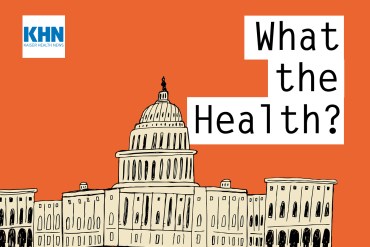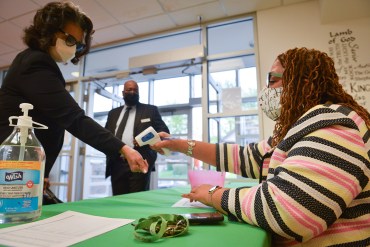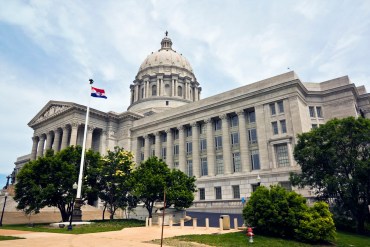Government Oversight of Covid Air Cleaners Leaves Gaping Holes
Thousands of schools have spent millions of federal covid relief dollars snapping up air cleaning technology that claims to inactivate covid-19. But the devices fall into a regulatory gap.
KHN’s ‘What the Health?’: How to Expand Health Coverage
Democrats in Congress and the states are devising strategies to expand health coverage — through the Affordable Care Act, Medicare, Medicaid and a “public option.” But progress remains halting, at best. Meanwhile, lawmakers in Washington may have to agree on how to control prescription drug prices if they wish to finance their coverage initiatives. Alice Miranda Ollstein of Politico, Tami Luhby of CNN and Shefali Luthra of The 19th join KHN’s Julie Rovner to discuss these issues and more. Also, Rovner interviews Michelle Andrews, who reported and wrote last month’s KHN-NPR “Bill of the Month” episode about a very expensive sleep study.
What It Means When Celebrities Stay Coy About Their Vaccine Status
St. Louis Blues leading scorer David Perron took 10 days to explain he had indeed been vaccinated before he caught covid-19, which knocked him from playing in the NHL playoffs against the Colorado Avalanche. His case and those of other public figures raise questions about the role of celebrity in enticing people to get covid vaccinations.
More Than 100 Missouri Schools Have Bought ‘Often Unproven’ Air-Cleaning Technology
Across Missouri, more than 100 schools have spent over $3.5 million — often at the taxpayers’ expense — snapping up ionization and other air-purifying devices in an attempt to keep kids safe from covid-19. But experts warn the largely unregulated technology hasn’t been thoroughly tested in classroom settings and is “often unproven.”
For Toddlers, Pandemic Shapes Development During Formative Years
The pandemic created disruption and family stress that may have lasting effects on young children’s social and emotional development.
Boeing Tested Air Purifiers Like Those Widely Used in Schools. It Decided Not to Use Them in Planes.
The technology that schools have been snapping up in the fight against covid “has not shown significant disinfection effectiveness” to install on its planes, Boeing found. Now the company’s study is being debated in a proposed class-action suit.
Kidney Experts Say It’s Time to Remove Race From Medical Algorithms. Doing So Is Complicated.
When estimating how well a patient’s kidneys are working, doctors frequently turn to an equation that depends on a question: Is the patient Black? Kidney experts are now debating how to remove the race adjustment and whether the question is a function of sound science. It’s considered just the first step in dismantling institutional racism in kidney care.
In Missouri and Other States, Flawed Data Makes It Hard to Track Vaccine Equity
Racial and ethnic categories for vaccination data vary widely from one state to another, complicating efforts to distribute shots where they are needed most. In Missouri, some red flags in the data surfaced, making health officials question its usefulness.
Little-Known Illnesses Turning Up in Covid Long-Haulers
A significant number of post-covid patients suffer from syndromes that few doctors understand.
No-Cancel Culture: How Telehealth Is Making It Easier to Keep That Therapy Session
No-shows for behavioral health appointments have been a long-standing problem, with up to 60% skipped. Now telehealth, fueled by the pandemic, makes it easier for people dealing with depression and other mental health issues to make it to their appointments at a time when such care is in high demand. But teletherapy creates other challenges.
Covid Shot in the Arm Not Enough to Keep Pharmacies in Business
Pandemic lockdowns exacerbated long-standing economic pressures on pharmacies — and forced many owner-operated shops to evolve or risk closing their doors.
In Appalachia and the Mississippi Delta, Millions Face Long Drives to Stroke Care
Across Appalachia and the Mississippi Delta, where death rates from stroke are above the national average, routing patients from rural areas to the right level of care can be an intricate jigsaw puzzle. The closest hospital might not offer the full scope of stroke treatments, but hospitals with more advanced care could be hours away.
As Schools Spend Millions on Air Purifiers, Experts Warn of Overblown Claims and Harm to Children
A KHN investigation found that more than 2,000 schools have spent millions of dollars for systems, lured by air purifier companies’ claims that experts say mislead or obscure the potential for harm from toxic ozone.
‘Red Flag’ Gun Laws Get Another Look After Indiana, Colorado Shootings
It’s unclear whether “red flag” laws — which allow the seizure of guns from a person deemed dangerous — help prevent mass shootings or should have been applied to the suspects in recent shootings in Boulder, Colorado, and Indianapolis.
Virtual Care Spreads in Missouri Health System, Home to ‘Hospital Without Beds’
In 2015, St. Louis-based Mercy health system opened what officials called the world’s first “hospital without beds.” Since the pandemic, Mercy has incorporated telehealth throughout its system, part of a national acceleration in virtual care that proponents laud but critics say is happening too fast.
Public Health Experts Worry About Boom-Bust Cycle of Support
Congress has poured tens of billions of dollars into public health since last year. While health officials who have juggled bare-bones budgets for years are grateful for the money, they worry it will soon dry up, just as it has after previous crises such as 9/11, SARS and Ebola. Meanwhile, they continue to cope with an exodus from the field amid political pressure and exhaustion that meant 1 in 6 Americans lost their local health department leader.
Snag a Vaccine Appointment, Then Face the Next Hurdle: How to Get There?
For some, a vaccine appointment a few hours away is no biggie. For others, it’s a major barrier to gaining protection from the coronavirus.
Redfield Joins Big Ass Fans, Which Promotes Controversial Covid-Killing Technology
Dr. Robert Redfield, Trump’s CDC director, lends his scientific credibility to its Clean Air Systems subsidiary, which touts a “virus-killing ion technology” added to its fans. But indoor air quality experts question whether some of its technology works in the real world.
The Gender Vaccine Gap: More Women Than Men Are Getting Covid Shots
A KHN examination of state vaccine statistics shows that more women than men have gotten covid vaccines. Experts cite demographic realities of those who were part of the initial rollout but also women’s greater likelihood to seek preventive health care.
Missouri ‘Voted for This Lie,’ Says State Rep Trying to Block Medicaid Expansion
Even with extra federal dollars and a flush budget, Show Me State Republicans are putting up roadblocks to the voter-approved constitutional amendment that would give 275,000 people health insurance.


























